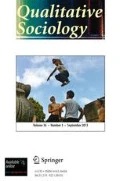Abstract
This paper describes the process used by a research team to develop a coding system for analyzing data from interview transcripts and situates the process within approaches to qualitative analysis. Successive versions of the coding scheme illustrate its development over several years; the role of team members and verification in this evolution are discussed. Several lessons emerge from our experience: a) coding is not what happens before analysis, but constitutes an important part of the analysis; b) a team builds codes and coding builds a team through the creation of a shared understanding of the phenomenon; and c) collaborative qualitative research requires a kind of rigor that an independent researcher might not be aware of or need.
Similar content being viewed by others
REFERENCES
Bereiter, C., and Scardamalia, M. (1989). Intentional learning as goal of instruction. In L. B. Resnick (Ed.), Knowing, learning and instruction: Essays in honor of Robert Glaser (pp. 361-392). Hillsdale, NJ: Lawrence Erlbaum.
Berliner, D. C. (1992). Telling the stories of educational psychology. Educational psychologist, 27, 143-161.
Bracewell, R. J., and Breuleux, A. (1994). Substance and romance in the analysis of think-aloud protocols. In P. Smagorinsky (Ed.), Speaking about writing: Reflections on research methodology (pp. 55-88). Newbury Park, CA: Sage Publishing.
Breuleux, A. (1991). The analysis of writers' think-aloud protocols: Developing a principled coding scheme for ill-structured tasks. In G. Denhi`ere & J.-P. Rossi (Eds.), Texts and text processing (pp. 333-362). Amsterdam: North-Holland.
Charmaz, K. (1990). “Discovering” chronic illness: Using grounded theory. Social Science and Medicine, 30, 1161-1172.
Constas, M. A. (1992). Qualitative analysis as a public event: The documentation of category development procedures. American Education Research Journal, 29, 253-266.
Creswell, J. W. (1998). Qualitative inquiry and research design: Choosing among five traditions. Thousand Oaks: Sage.
Eisner, E. W. (1998). The enlightened eye: Qualitative inquiry and the enhancement of educational practice. Upper Saddle River, NJ: Prentice-Hall.
Erickson, F. (1986). Qualitative methods in research on teaching. In M. C. Wittrock (Ed.), Handbook of research on teaching (3rd ed.) (pp.119-161). New York: Macmillan.
Frederiksen, C. H. (1986). Cognitive models of discourse analysis. In C. R. Cooper & S. Greenbaum (Eds.), Written communication annual: Vol. 1. Linguistic approaches to the study of written discourse (pp. 227-267). Beverly Hills, CA: Sage Publishing.
Guba, E. G., & Lincoln, Y. S. (1989). Effective evaluation: Improving usefulness of evaluation results through responsive and naturalistic approaches. San Francisco: Jossey-Bass.
Howe, K., & Eisenhart, M. (1990). Standards for qualitative (and quantitative) research: A prolegomenon. Educational Researcher, 19, 2-9.
Kirk, J., & Miller, M. L. (1986). Reliability and validity in qualitative research. Beverly Hills, CA: Sage.
Lincoln, Y. S. (1990a). Campbell's retrospective and a constructivist's perspective. Review of D. T. Campbell, Review of Methodology and Epistemology for Social Science. In J. A. Maxwell & Y. S. Lincoln, Methodology and epistemology: A dialogue. Harvard Educational Review, 60, 501-504.
Lincoln, Y. S. (1990b). Response to “Up from positivism.” In J. A. Maxwell & Y. S. Lincoln, Methodology and epistemology: A dialogue. Harvard Educational Review, 60, 508-512.
Maxwell, J. A. (1990). Response to “Campbell's retrospective and a constructivist's perspective.” In J. A. Maxwell&Y. S. Lincoln, Methodology and epistemology:Adialogue. Harvard Educational Review, 60, 504-508.
Maxwell, J. A. (1992). Understanding and validity in qualitative research. Harvard Educational Review, 62, 279-300.
Maxwell, J. A. (1996). Qualitative research design: An interactive approach. Thousand Oaks: Sage.
McAlpine, L. & Weston, C. (1996). Researching reflection: A metacognitive model. American Educational Research Association, New York, April.
McAlpine, L., Weston, C., Beauchamp, J., Beauchamp, C.,& Wiseman, C. (1997). Building a model of reflection on teaching: New findings and insights. American Educational Research Association, Chicago, March.
McAlpine, L., Weston, C., Beauchamp, J., Wiseman, C.,& Beauchamp, C. (1999a). Building a metacognitive model of reflection. Higher Education, 37, 105-131.
McAlpine, L., Weston, C., Beauchamp, C., Wiseman, C.,& Beauchamp, J. (1999b). Monitoring student cues: Tracking student behavior to improve instruction in higher education. Canadian Journal of Higher Education, 29-2, 113-144.
McAlpine, L., Weston, C., Beauchamp, C., Wiseman, C., & Beauchamp, J. (1999c). Reciprocity in the research process: Learning opportunities for both participants and researchers. American Education Research Association, Montreal, April.
Miles, M. B., & Huberman, A. M. (1994). Qualitative data analysis (2nd ed.). Thousand Oaks: Sage.
Miller, S. M., Nelson, M.W.,& Moore, M. (1998). Caught in the paradigm gap: Qualitative researchers' lived experience and the politics of epistemology. American Educational Research Journal, 35, 377-416.
Mishler, E. G. (1990). Validation in inquiry-guided research: The role of exemplars in narrative studies. Harvard Educational Review, 60, 415-442.
Newell, A. & Simon, H. A. (1972). Human problem solving. Englewood Cliffs, NJ: Prentice Hall.
Strauss, A. L., & Corbin, J. (1990). Basics of qualitative research: Grounded theory, procedures and techniques. Newbury Park, CA: Sage.
Webb, G. (1997). Deconstructing deep and surface: Towards a critique of phenomenography. Higher Education, 33, 195-212.
Weston, C., LeMaistre, C., McAlpine, L., & Bordonaro, T. (1997). The influence of participants in formative evaluation on the improvement of learning from instructional materials. Instructional Science, 25, 369-386.
Weston, C., & McAlpine, L. (1998). Improving university teaching: Understanding and applying a cognitive model of reflection. American Educational Research Association, San Diego, April.
Author information
Authors and Affiliations
Corresponding author
Rights and permissions
About this article
Cite this article
Weston, C., Gandell, T., Beauchamp, J. et al. Analyzing Interview Data: The Development and Evolution of a Coding System. Qualitative Sociology 24, 381–400 (2001). https://doi.org/10.1023/A:1010690908200
Issue Date:
DOI: https://doi.org/10.1023/A:1010690908200




